Making healthy connections, one shopper at a time
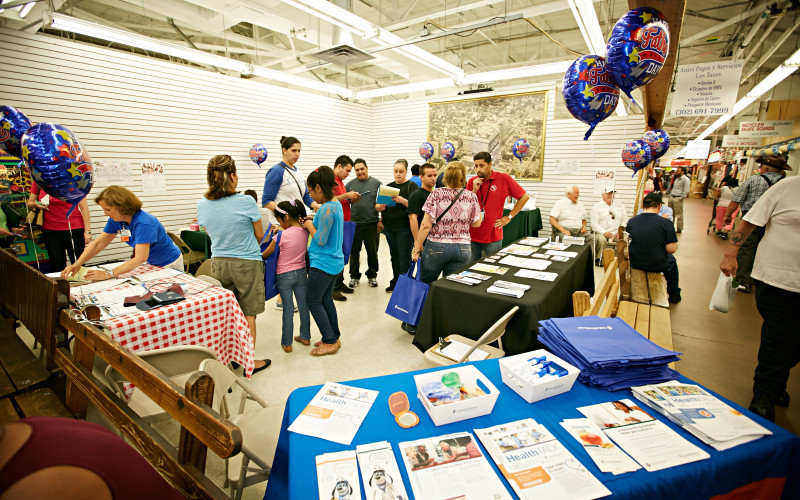
It’s a busy Friday at New Castle Farmers Market, and shoppers are browsing for healthy fruits and vegetables, bargains on kids’ clothes — and resources to keep themselves and their families healthy.
For the past five years, education and outreach workers from Christiana Care Health System have brought free health screenings and vital information directly to the people at the farmers market, offering “Health Info on the Go.” On a typical day, 75-100 shoppers stop by the Christiana Care booth, where there are displays on topics such as colorectal cancer and breast health. Shoppers ask outreach workers questions and can take home educational brochures in English and Spanish.
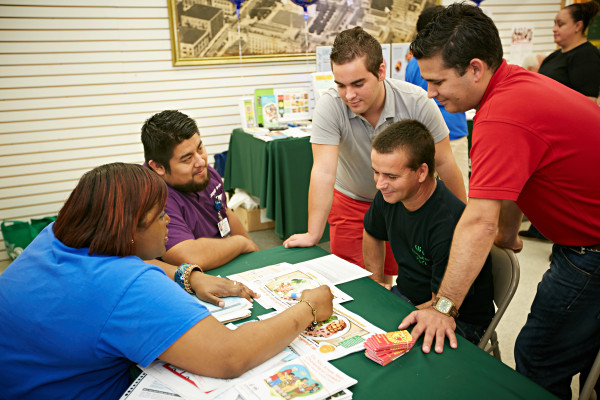
Christiana Care has held 41 events at the market. In all, more than 1,300 people have received cardiovascular screenings. Many come from underserved communities and lack ready access to care. For example, of the more than 260 people screened at the market in 2011 and 2012, 52 percent were minorities; 28 percent had no insurance; and 27 percent had not seen a doctor in a year or more.
“When you look at the farmers market, you see a diverse group of people that reflects our catchment area: Hispanics, Asians, young families and seniors, as well as people from downstate and Pennsylvania,” said Nora Katurakes, MSN, RN, OCN, manager of the Community Health Outreach & Education Department at the Helen F. Graham Cancer Center & Research Institute.
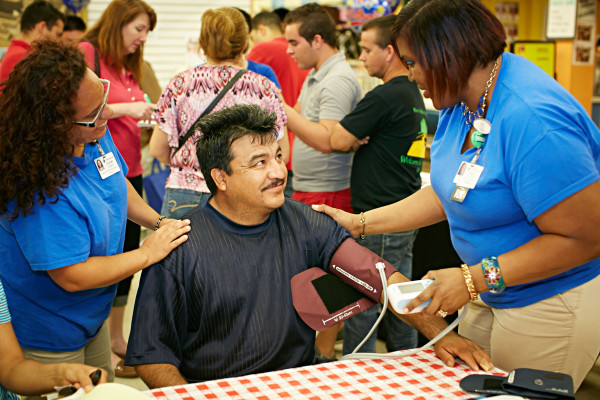
On one afternoon at the market, Alberto Aguilar Baca, 43, of New Castle, learned that he is at increased risk for heart attack. His blood pressure was in the borderline-high range. Blood tests showed his glucose levels were elevated and his body was not producing enough “good cholesterol,” the substance that protects against the bad cholesterol that clogs arteries and causes strokes and heart attacks.
“The conversation is in a nonthreatening place, and people will ask us questions that they don’t have an opportunity to ask somewhere else. That connection breaks down barriers so people can get the care they need.”
Baca does not speak English. So Juan Navarro, a Christiana Care medical interpreter, worked with Renitia Pulliam, RN, a community outreach nurse, to explain his test results, interpreting from English to Spanish. She encouraged him to follow up with his doctor. Then she showed him a chart depicting various foods and talked about a heart-healthy diet, urging him to avoid fatty foods, including butter, egg yolks and processed meats such as hotdogs and sausages. Baca left the market armed with knowledge to take steps to improve his own health.
Christiana Care developed this creative farmers market model to connect underserved people with care and information, and to help eliminate disparities in care. A team of dedicated, culturally diverse, multilingual outreach workers engage shoppers through routine screenings for blood pressure, cholesterol and blood sugar, and education about health, cancer screenings, and prevention and early detection of disease.
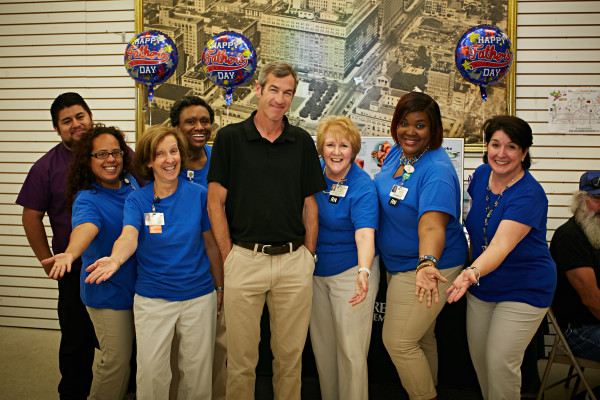
Each farmers market event has a different health-related theme. On June 13, for Father’s Day, the theme was men’s health. Outreach and education workers wore blue T-shirts and educated men and their loved ones about prostate cancer, lung cancer and other topics. A total of 41 people received health screenings. Of those, 10 required followup for mammograms, colonoscopies or both.
Paul Coulby, Lee Seward and Ray Jones are friends who enjoy going to the farmers market to people-watch. Several years ago, they set up chairs by the Christiana Care booth. Soon, they found themselves watching outreach workers educating shoppers on such concerns as secondhand smoke, diabetes and skin cancer.
“We see the way the Christiana Care folks interact with people and they do a fine job,” Coulby said. “So now we get our blood pressure checked.”
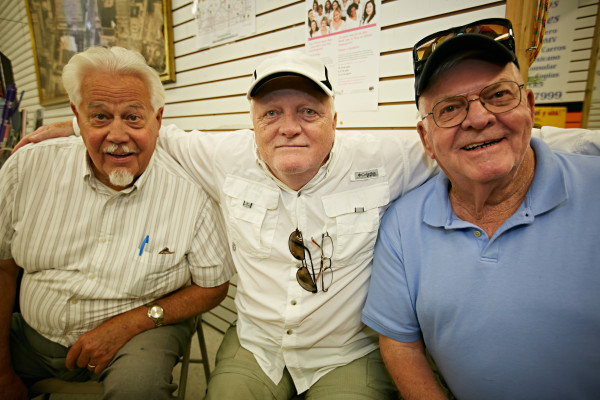
Raul Landa Ruiz and his 18-year-old son Jhonathan Landa Niebla recently arrived from Cuba and are staying with an aunt in Newark, who took them to the farmers market so they could receive free screenings and learn how to get access to primary care. Their aunt had heard about the event through the Latin American Community Center in Wilmington.
Joining forces to get the word out to neighbors is an important part of Christiana Care’s outreach. Christiana Care has partnered with the Alzheimer’s Association, Beautiful Gate, an HIV center, the Latin American Community Center, United Health Care and other organizations to come to the market and offer their resources at the monthly events. The outreach team also encourages the market vendors to participate by encouraging shoppers to check out the free health information and screenings.
Greg Beecher, general manager of the farmers market, thoroughly supports the effort by providing free space, tables and chairs. He has donated items for events such as fruit, pretzels and balloons, and he helps to promote the events with fliers and announcements.
“It’s good for the public, good for our shoppers and always a very positive experience,” Beecher said.
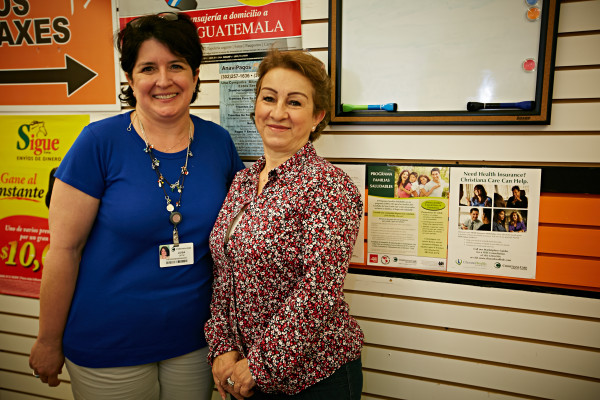
Christiana Care has enlisted a variety of its services to participate in events at the farmers market. For example, Christiana Care providers in nuclear medicine and imaging have brought bone-density screenings to the market. Christiana Care’s Marketplace Guides help to connect uninsured people with health insurance.
You can help! Your support can help Christiana Care’s efforts to provide access to health care to underserved communities in Delaware. Learn more.
Beatriz Velasquez, who moved to the U.S. from Colombia, works for a vendor at the market. She doesn’t have health insurance and wondered how she could afford preventive screenings. Luisa Ortiz-Aponte and Joceline Valentin, outreach and education workers, connected her with Christiana Care’s annual skin cancer screening event. They also made arrangements for her to receive a free mammogram at the Christiana Care Breast Center through a grant from Susan G. Komen for the Cure — Philadelphia.
Velasquez had been concerned about getting a mammogram. But until she met the outreach workers, she didn’t know who to ask for help.
These connections flourish at the market, where shoppers know they can turn to Christiana Care for expert, respectful health education and screenings.
“The conversation is in a nonthreatening place, and people will ask us questions that they don’t have an opportunity to ask somewhere else,” Katurakes said. “That connection breaks down barriers so people can get the care they need.”